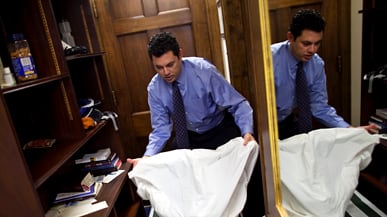For members of Congress who often sleep in their offices, a government shutdown could mean more than just professional angst; it could mean a serious personal problem.

Utah congressman Republican Jason Chaffetz sleeps on a cot next to his desk whenever he’s in Washington, and word that the House gym could be shut down does have consequences for him beyond losing muscle mass. “I’ll have to figure out where the local YMCA is. I do plan on showering.”
According to a report by CBS earlier this year, up to one-fifth of all freshman lawmakers sleep in their Capitol Hill offices, some for just a night or two and some full-time while they’re in Washington. The rationale is usually to make a political argument exemplifying frugality and hard work, but many just want to save money that they’d rather spend with their family back in their districts. In January, Arizona Rep. Paul Gosar said he could save $20,000 each year by not paying rent or parking.
But if the government shuts down, many of the services that these Capitol-dwellers rely on will shut down, too. That includes the gyms and the main cafeterias. The Senate barbershop would stop cutting hair. Even people who ride elevators would have to ascend without the help of an attendant.
“I don’t know what we’ll do about food service,” says Douglas Rivlin, a spokesman for Illinois Rep. Luis Gutierrez, who spends most nights in the Rayburn Office Building, just south of the Capitol. Staffers, who generally don’t sleep in their bosses’ offices, still rely on Hill services such as bathrooms and security checkpoints. The Office of the Sergeant-at-Arms said Thursday that both would still operate, although perhaps in limited numbers. Says one staffer, who asked for anonymity: “Maybe it’ll get so miserable around here, they’ll pass a budget just to get the cafeterias working again.”
“Maybe it’ll get so miserable around here, they’ll pass a budget just to get the cafeterias working again.”
• Patricia Murphy: The Tea Party’s Budget Freakout • Michelle Cottle: Why I Pity Boehner • Government Shutdown: Full coverage Some members have faced the reality of working with limited staffs—or worse, that their aides can’t work, or communicate in the same always-reachable style enabled by government-issued Blackberrys. Staffers not considered essential won’t be able to volunteer their time, either. At Thursday’s White House briefing, Jeff Zients, deputy director of the Office of Management and Budget, said it is illegal to volunteer and that offenders would likely be punished.
Whether the House and Senate leadership should encourage members to stay in the Capitol has been a topic of bipartisan debate. “Frankly, if this government shuts down, I think we should break out the cots and require every senator and congressman to sleep right there in the Capitol Building until the work gets done,” says Montana Rep. Denny Rehberg. Democratic leadership officials sent members a list of talking points on Thursday, among them, advocating that in the event of a shutdown, members of Congress and the president shouldn’t be paid.
Michigan Rep. Tim Walberg also said he wasn’t concerned about what a Capitol with limited services would mean for him. “My hygienic arrangements are unimportant compared to the real issues and sacrifices at stake.”
But at least one member has sought a back-up plan to a Capitol with limited services. When Rep. Lee Terry mused about what he would do if the Capitol became unlivable, his chief of staff kindly offered a guest room in his home for the congressman (if a shutdown happens; he’ll take it). Hotel rooms have also become a viable option, though several Hill hotels reported only premium rates being available. The boutique Liaison Capitol Hill hotel several blocks from the Capitol said it is sold out next week.
Others are prepared to hunker down and be resourceful. As some House dwellers wait for details on what to do, Rep. Chaffetz says he isn’t concerned about what’s open or not. “You don’t have to go too far to find things around here,” he says. “And I will always find food.”
Daniel Stone is Newsweek's White House correspondent. He also covers national energy and environmental policy.
Eve Conant is a Newsweek staff reporter covering immigration, politics, social and culture issues.







